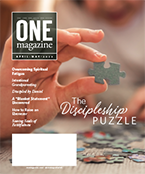
April-May 2023
The Discipleship Puzzle
------------------
|





BETTER TOGETHER | The Gift of Encouragement
Flight attendants, teachers, nurses, law enforcement officers, shop keepers, government leaders, pastors—just about everyone seems a bit discouraged these days. We seem long removed from the proverbial “Home on the range…where seldom is heard a discouraging word.” These days, we are more likely to encounter signs like “Please be patient with our staff. We are short-handed.”
Today, discouragement is pervasive and overwhelming. What can we do about it? We can share the gift of encouragement.
Does encouragement really help? Sometimes, the situation seems so dire an "attaboy" seems ineffective. But we find two clear encouragement models in Scripture who did some of their best work during darkest times. Take Boaz, who encouraged others during the times of the judges (Ruth 1:1). I can become discouraged just reading about those dark days (Judges 9, 11, 19). We also read about Barnabas (Acts 4:36) who encouraged the early church when Christians were being threatened and persecuted (Acts 4:7, 21).
Perhaps one of Satan’s biggest lies is our gift of encouragement will be ineffective. Scripture teaches the value of encouragement (1 Thessalonians 5:11-15), and research bears this out. For example, encouragement enhances marital satisfaction, [1] is a key component of successful parenting, [2] is critical to the development of resilience in families, [3] and is important in the development of leadership skills. [4] How can we give the gift of encouragement?
Smile. Smiling doesn’t just help us (Proverbs 15:30); it helps those around us. [5] We see this in Ruth 2:4. When Boaz walked through the fields and told workers, “The Lord be with you,” I believe he was smiling. And he elicited a positive response from the workers, “The Lord bless you,” indicating his interaction had a positive effect. We can behave similarly when boarding a plane, eating out, receiving medical treatment, or even responding to an officer after being pulled over, although this one is difficult!
Speak. A smile is the first step, but words are also needed. The right word at the right time can be very encouraging (Proverbs 25:11). Look for ways to speak encouragingly to strangers (Ruth 2:10, 13). Use words like “You are really handling a difficult situation well” or “I appreciate your presence in this trying time.”
Spoken encouragement also can be developmental in nature. Perhaps Barnabas told Paul, “I think you would be an excellent church planter” or John Mark, “I believe you would do well on a missionary journey.” When John Mark left him, I imagine him saying, “I still believe you can succeed.” While we don’t know exactly what Barnabas said, we know for certain he was an encourager, and, in both cases, we have evidence of good results (2 Timothy 4:11).
Write. We do well to write letters to pastors, government leaders, merchants, friends, and neighbors detailing our appreciation for tasks performed or time given. Even a short note can be encouraging, especially when those individuals typically receive criticism rather than appreciation.
Let’s make time to share this gift we call encouragement.
1 D. Rainey and B. Rainey. Building Up Your Spouse. Little Rock, Arkansas: Family Life. 2013.
2 L. A. Roggman, G. A. Cook, M. S. Innocenti, V. Jump Norman, and K. Christiansen. Parenting interactions with children: Checklist of observations linked to outcomes (PICCOLO) in diverse ethnic groups. Infant Mental Health Journal, 34, 290-306. 2013.
3 F. Walsh. Family resilience: A framework for clinical practice. Family Process, 42, 1-18. 2003.
4 D. Dinkmeyer, & L. D. Eckstein. Leadership by Encouragement. Boca Raton, FL: CRC Press. 1996.
5 J. Nikitin, & A. M. Freund. The Motivational Power of the Happy Face. Brain Science, 9(1):6. 2019.
|
|

